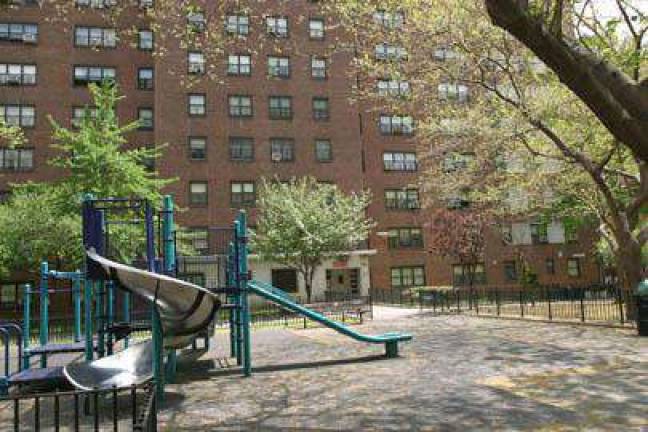NYCHA Land Lease Plan Met With Disapproval

Tenants and City Council members say NYCHA's plan is moving too quickly and without transparency A plan by the New York City Housing Authority (NYCHA) to generate much-needed revenue through land leasing has been met with uproar from public housing tenants and elected officials. NYCHA's land leasing plan involves eight different sites and 325,000 square feet of land, including public open space and at least one community center. The ground lease, which lasts for 99 years, would allow developers to build on the land while it remains under NYCHA ownership. NYCHA says this plan would generate 30 to 50 million dollars annually, or two percent of the organization's unmet capital. The land leasing program involves primarily development of housing, including 4,000 private housing units with 80 percent at market rate and 20 percent permanently affordable units. NYCHA residents will receive priority for the new housing. Some of the development will also involve commercial space. According to public housing residents and elected officials who showed up to a City Council hearing last week, NYCHA is moving forward too quickly with the ground leasing plan and refusing to address tenants' numerous concerns. City Council member Rosie Mendez is one elected official outspoken in opposing the plan as it currently stands. "NYCHA should wait longer so residents can review [the plan], adequately respond and have the opportunity to stop it if they so decide," she said. "There is a difference between getting feedback and doing something with that feedback." She added that residents of public housing have concerns about every single aspect of the plan and should have been consulted from the very beginning of its formulation. NYCHA Chairman John Rhea said the organization is facing aging housing stock and the rent they collect only provides half of their operating costs. "We've seen a dramatic change in assistance received from government officials," he explained. "There has been a precipitous decline in federal government funding." He explained while other cities would resort to reducing public housing stock, "preserving public housing is the only proven option in New York City." "There are not enough options for low income families, this mission is more relevant than ever before," explained Rhea. "Given the pressures faced by the government on all levels, we must find ways to chart our own path and do more with less." "Preservation comes with tradeoffs and hard decisions," he added. Nonetheless, City Council officials and tenants have made their views clear. Assemblymember Brian Kavanagh said: "While we're fighting at the state level, we need to make sure NYCHA cannot unilaterally sell off NYCHA housing." "Decisions of this significance need a full hearing," said Kavanagh. "A real process means at the end of the day there's a 'yes' or a 'no.'" Councilmember Melissa Mark-Viverito noted 2,000 children attend a community center which would be eliminated by the plan, and questioned where they would go instead. She said a full review would be done for luxury condos, and the same courtesy must be given for public housing. Jane Wisdom, President of the Frederick Douglass Houses, said she is overwhelmed by NYCHA's actions. "They're pushing us and the tenants are very upset," said Wisdom. "We worry about the quality of life, we want time." Lela Santiago, a senior tenant at the Meltzer Houses said NYCHA has been tricking tenants by using sign-in forms at their meetings as a display of consent, while many tenants show up just to be informed or voice their disapproval of the plan. "There is no tenant involvement," she said. "They manipulate us." Despite concerns by tenants, Rhea assured community members every cent generated by the plan will be used for capital improvement. NYCHA says it will create permanent jobs for its residents, not demolish a single building and avoid increasing rent or hurting anyone's current work situation. Rhea added tenants' relationships with their landlords will not be affected by the plan and the plan will not go forward without full engagement with all residents, council members and stakeholders. "This is our single largest opportunity to make money to reinvest in public housing and the time to act is now," said Rhea. "The challenges aren't going anywhere and become more urgent with every year that passes."